<Back to Index>
- Staff Sergeant of the French Army Raphaël Onana, 1919
- Director of Political Affairs Gaston Palewski, 1901
- National Commissioner for the Economy, Finance, the Colonies and Foreign Affairs René Pleven, 1901
- Head of the Special Services Branch Jacques Soustelle, 1912
PAGE SPONSOR
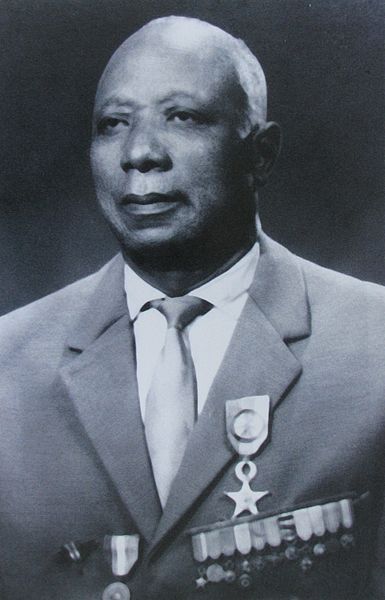
Raphaël Onana, born on 14 July 1919, at Poupouma, in Nkol Okala a village in the Province du Centre to the northwest of Yaoundé, the capital of Cameroon, and died 11 November 2002, at Yaounde, was a Free French soldier of Cameroonian origin, naturalized French.
On 17 June 1939, he enlisted voluntarily as a sergeant in the Cameroon militia, due to his imposing stature (1.88m) and his strategic skills, to the 1er régiment de tirailleurs du Cameroun (First Regiment of Cameroon Rifles); and later as a staff sergeant in the Hadfield - Spears Ambulance Unit. After the war, he married in the Christian tradition Rita Essah Tsimi, with whom he had ten children (Casmile, Jeanne, Etienne, Agrippine Awoundza, Lazare Ekongo, Métila Françoise, Essah Nathalie, Zobo Ostomac, Akamba Marie - Solange, and Nsing Marius Patrice). He was made a French citizen in 1951 by President Charles de Gaulle.
At the outbreak of World War II the militia of Cameroon for the most part joined the Free French forces, led by Captain (later Colonel then General) Philippe Leclerc de Hauteclocque. As such, Raphaël Onana was involved in the Gabon Campaign in November 1940, and the Syria - Lebanon Campaign from June to December 1941. The rifles of the Raphaël Onana's regiment were models MAS-36.
Cameroon rallied to Free France in July 1940, as did the majority of educated Cameroonians, but some German speaking Cameroonians were arrested and convicted of spying for Nazi Germany. On 28 December 1941, Onana was deployed to the desert. Thus he became a companion in arms of veterans of the Battle of Bir Hakeim, which held back Erwin Rommel, after which Charles de Gaulle declared that they had been "the pride of France".
It was at Bir Hakeim that Raphaël Onana was seriously injured by several 9×19 mm Parabellum rounds from an MP 40 submachine gun during the night of 10 June 1942 and was taken prisoner. Deported to Italy, he was exchanged as a prisoner of war in November 1942. Repatriated, he received final discharge in April 1943, because of his war injury, amputating his left leg.
In 1945 French Cameroon became a country under supervision of the United Nations, which had replaced the League of Nations. Then it became in 1946 an "associated territory" of the French Union. Despite the exceptional courage of Raphaël Onana, he could never become a warrant officer, because of the color of his skin. The Free French Forces hesitated to promote a black Central African from non - commissioned officer to sergeant major.
Raphael Onana had supported "l'Union fraternelles des anciens combattants d'expression Française africains et malgaches" (UFACEFAM) (tr: Fraternal Union of French speaking Veterans of Africa and Madagascar) along with the Ambassador of France in Cameroon. He had been elected president of "l'Amicale des anciens Combattants du Cameroun" (tr: the Cameroon Association of Veterans) and was assisted by Doctor Simon Pierre Tchoungui, who was later a prime minister of Cameroon.
Raphael Onana was invited to the Élysée Palace by President Charles de Gaulle in December 1962. There he was decorated with the National Order of the Legion of Honor and many other awards.
Raphael Onana had been in combat with a famous soldier: Simon Bikié Noah, the grandfather of Yannick Noah, the winner of the 1983 French Open of international tennis. He knew him as a comrade - in - arms despite 20 years of age difference. Raphaël remembered having shared with him the experiences of command because Simon had the motivations of the tribal chief. When Raphaël had learned the death of his former colleague Simon Noah, who was killed by a Cameroonian soldier during the 1985 coup d'état in Cameroon, under the influence of the coups in Mauritania, Guinea and Sudan, he strongly protested the curfew ordered by the Cameroonian putsch. He immediately contacted Simon Pierre Tchoungui (the ex-Prime Minister of Cameroon) to make him familiar with the changes to the arrests by the putsch in order to secure his family and friends.
Before the Independence of Cameroon in 1 January 1960, Raphael Onana was a judge in the French courts.
From the age of 3 years, Raphaël Onana spent his youth with much frustration caused by the loss of his father Ékongo Akon' Awana, who died at 33 years old. Local peasants held that he had been poisoned by sorcerers. He was raised by his mother Regina Awundza, who was a Béti and spoke an Éton dialect. He had two sisters, the eldest, Zobo, born in 1910, and the youngest, Ng'Onana, born in 1922. Between 1910 and 1919, there were four other children born, all boys, who consecutively died by way of disease.
Ékongo Akon'Awana was a Bakassa warrior with an uncommon physical strength, courageous, dangerous, clever, cruel and bloodthirsty. Villagers near Poupouma had dishonored his second wife and widow, Regina Awundza, and her children. His first wife, Métil, had a daughter, half sister of Raphaël, Johanna Ngazomo Métila. Ékongo Akon' Awana felt himself unfortunate as not to have a male heir despite his polygamy and his prayers for Zamba Ntond' Obé, a pagan god that resembled the primordial deities Gaia or the mother goddess in Europe.
Ékongo is a word of dialect which can mean lance or javelin, a symbol of the warrior during tribal wars. He was a pious pagan animist. Édounga Zoa, the Cameroonian sorcerer, told him that he had been cursed not to have a son because of his crimes in order to defend his territory of Poupouma. When Regina Awundza was pregnant, Ékongo Akon' Awana had given his agreement to the wizard Édounga Zoa, by his incantations, to have a son of irreproachable health. This had a special condition: stop killing passers-by.
In this way, the sorcerer Édounga Zoa had declared, after finishing his incantations, "Regina Awundza, currently pregnant, would soon bring into the world a boy. He would never die, as his four elder brothers had. Instead, he will live very long time, have abundant offspring and experience glory...." This explains the word "sheltered" in the title of his work.
In Cameroon, it is customary to take a name of someone else you love. Raphaël Onana had chosen to take the name of his younger sister, Ng'Onana, born in 1922, instead of taking the name his father Akon' Awana who had a bad reputation because of his crimes on Poupouma. Raphaël Onana wished to turn the page and make the villagers around Poupouma forget their anger.
Raphaël Onana told Charles de Gaulle before the presentation of medals at the Élysée Palace in December 1962:
" When one has only one leg, it must be worth two! When one does not hear, the eyes must be worth four! "
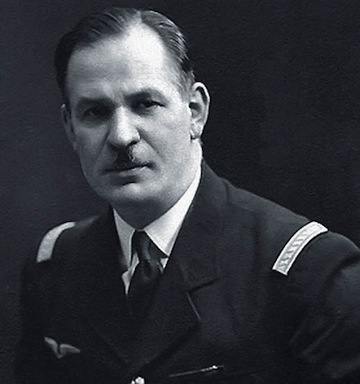
Gaston Palewski (20 March 1901 - 3 September 1984), French politician, was a close associate of Charles de Gaulle during and after World War II. He is also remembered as the lover of the English novelist Nancy Mitford, and appears in a fictionalized form in two of her novels.
Palewski was born in Paris, the son of an industrialist. His family was of Polish origin and had lived in France since the 19th century. He was educated at the Sorbonne, at the Ecole des Sciences Politiques and at Oxford University - he spoke excellent English and was a convinced Anglophile. Using family connections, he obtained a post with Marshal Hubert Lyautey, the French Resident General in Morocco. In 1928 he became principal private secretary to Paul Reynaud, a leading politician who was then Minister for Finances and who became Prime Minister of France in March 1940. Through Reynaud, in 1934, he first met Charles de Gaulle, and became a supporter of his political and military views.
On the outbreak of war in 1939 Palewski was commissioned as a lieutenant in the French Air Force, and saw action following the German invasion of France in May 1940. He was in French North Africa at the time of the armistice of June 1940. Refusing to accept France's defeat, he reached London at the end of August and joined de Gaulle's Free French Forces. De Gaulle appointed him Director of Political Affairs of the Free French movement, and he played a leading role in negotiations between de Gaulle and the British government, which at first regarded de Gaulle with skepticism. In March 1941 he was given the rank of lieutenant colonel and command of the Free French Army in East Africa, leading it against the Italian forces during the recapture of French Somaliland (now Djibouti). In September 1942, he was recalled to London to become de Gaulle's "Directeur du Cabinet," a post in which he followed de Gaulle from London to Algiers in 1943 and then in August 1944 to liberated Paris. He became known as de Gaulle's "homme de confiance" (right - hand man), and his diplomatic skills and knowledge of the English made him invaluable to de Gaulle, who neither understood nor trusted them.
Palewski remained director of the de Gaulle's cabinet (that is, his private office) until de Gaulle's resignation as head of the Provisional Government in January 1946. He then became a leading proponent of Gaullism and one of the founders of the first Gaullist party, the Rassemblement du Peuple Français (Rally of the French People, or RPF) in 1947. In 1951 he was elected to the National Assembly as an RPF deputy for the Department of the Seine (Paris). From 1953 to 1955 he was vice president of the National Assembly. Following the failure of the RPF, however, he withdrew from politics. In 1957, at de Gaulle's request, he was appointed Ambassador to Italy, a post he held until 1962. In 1962 Palewski was appointed by Prime Minister George Pompidou as Minister of State in charge of Scientific Research, Atomic Energy and Space Questions, the first French minister with specific responsibility for such matters. On 1 May 1962 Palewski witnessed the French underground nuclear test codenamed "Beryl" in Algeria. The test shaft failed to contain the blast and he was exposed to radiation as result of a leak of radioactive lava and dust into the atmosphere. He believed that the leukemia which he contracted later in life was caused by this accident. From 1965 to 1974 he was President of the Constitutional Council of France. Palewski died of leukemia in 1984, aged 83.
After 1974 he held a number of honorary posts. An amateur painter of some talent, he was a member of the Académie des Beaux Arts.
Because of his high office and his record in the war Palewski was awarded several French decorations. After his term as an ambassador to the Italian government, not to the Holy See, he was awarded an Italian Grand Cross.
- The Grand Croix of the Légion d'Honneur,
- The title and cross of a Compagnon de la Libération,
- The Croix de Guerre (twice),
- The Médaille Coloniale, with a bar
- The Croix du combattant volontaire 1939 – 1945.
- The Grand Cross of the Order of Merit of the Italian Republic
In his personal life, Palewski was a notorious and reckless womanizer, and this earned him a reputation for frivolity that damaged his prospects for a serious political career. Only his standing with de Gaulle, to whom he was devoted and totally loyal, enabled him to hold high office. During the war in London he met the English writer and society figure Nancy Mitford, and began with her a long, passionate but intermittent affair. They were separated during the latter part of the war, but in 1946 she moved permanently to Paris, and their relationship, though never public, lasted until her death in 1973. This did not prevent him becoming involved with many other women. In 1969, without formally ending his affair with Mitford - he was with her when she died - he married Helen - Violette de Talleyrand - Périgord (1915 – 2003), duchesse de Sagan, the daughter of the seventh duc de Talleyrand and his wife Anna Gould. The two had been having a long affair prior to the duchesse's divorce from her first husband and had had a son out of wedlock.
In the English speaking world Palewski is known chiefly through his appearance as Fabrice, duc de Sauveterre, in two of Nancy Mitford's novels, The Pursuit of Love (1945) and Love in a Cold Climate (1949). The first of these contains a fairly accurate portrayal of their relationship, although it is moved from postwar to prewar Paris. Despite Mitford's love for Palewski, she depicted him in a very clear - eyed way in these novels, with no attempt to disguise his many infidelities. He took no offense at this, and when Mitford proposed to dedicate The Pursuit of Love to "The Colonel," he insisted on his real name being used.
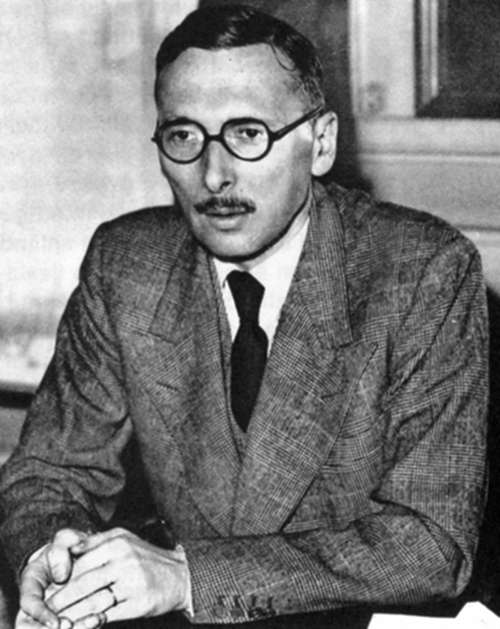
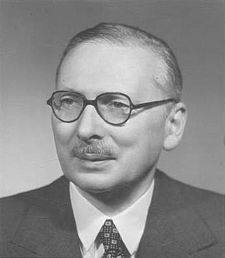
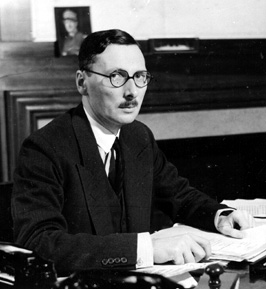
René Pleven (15 April 1901 – 13 January 1993) was a notable French politician of the Fourth Republic. A member of the Free French, he helped found the Democratic and Socialist Union of the Resistance (UDSR), a political party that was meant to be a successor to the wartime Resistance movement. He served as prime minister several times in the early 1950s, where his most notable contribution was the introduction of the Pleven Plan, which called for a European Defense Community between France, Italy, West Germany and the Benelux countries.
René Pleven was born in Rennes on 15 April 1901 as the son of a commissioned officer and director of studies at the Special Military School of St. Cyr. After studying law at the University of Paris, he failed the exam for the financial corps of the civil service, so he decided to move to the United States, Canada and Great Britain to work there. He rose to the become a telephone company executive. In 1934, he married Anne Bompard.
Immediately after the breakout of the Second World War, he was in charge of encouraging the construction of aircraft for the Allies in the United States and of purchasing planes for France. As late as 1939, Pleven stated that "Politics do not interest me," but then a year later, he joined Charles de Gaulle's Free French Forces, which resisted the Nazi allied French Vichy Regime. Pleven helped rally support for Free France in French Equatorial Africa. Returning to London, where de Gaulle and his forces were exiled, in 1941, he became national commissioner for the economy, finance, the colonies and foreign affairs of the French National Committee. In this role, he presided over a 1944 conference in Brazzaville, which opted for a more liberal policy towards the colonies and ultimately spurred the region's independence movements.
After France's liberation, he was the Minister of the Economy and Finance in the provisional government. After the war, Pleven was elected a legislator from the Côtes - du - Nord department. In 1946, he broke with Charles de Gaulle and founded the Democratic and Socialist Union of the Resistance (UDSR) serving as the party's president from 1946 to 1953. The party was positioned between the Radical Socialists and the Socialists, favoring limited industrial nationalization and state controls. He then held several Cabinet posts, most notably Defense Minister from 1949 to 1950. In July 1950 he became the country's Prime Minister, as power was shifting to the right. A vehement supporter of European integration, he pushed the ratification of the Schuman Plan for European integration creating the European Coal and Steel Community as Prime Minister. He had to face opposition from both left and right to push it through, but he collected enough votes in parliament by promising to increase farm loans and to lower taxes for low income groups. After three days and two nights of debate, the treaty was ratified. He served until February 1951 and then again from August 1951 to January 1952, resigning over disagreements about budget deficits.
He then became Defense Minister again. His proposal for a European Defense Community, in which to integrate a re-armed Germany, known as the Pleven Plan, was defeated by the Gaullists, communists and socialists. He also advocated a hard hand in defending French colonial rule in Indochina. In 1953, he resigned as chairman of the UDSR after his party supported the Vietnam peace talks. Being Minister of Defense from 1952 to 1954, he was responsible when the French lost the Battle of Dien Bien Phu initiating the crumbling of French hegemony in the whole region. In 1957, President René Coty offered him to become Prime Minister again, but he turned down. Instead, he became the Fourth Republic's last Foreign Minister in 1958.
In 1966, Pleven's wife died. He had had two daughters, Françoise and Nicole, with her. From 1969 to 1973, he served as Minister of Justice. Losing re-election as legislator in 1973, he became president of a regional development council in his native Brittany. He died of heart failure on 13 January 1993.
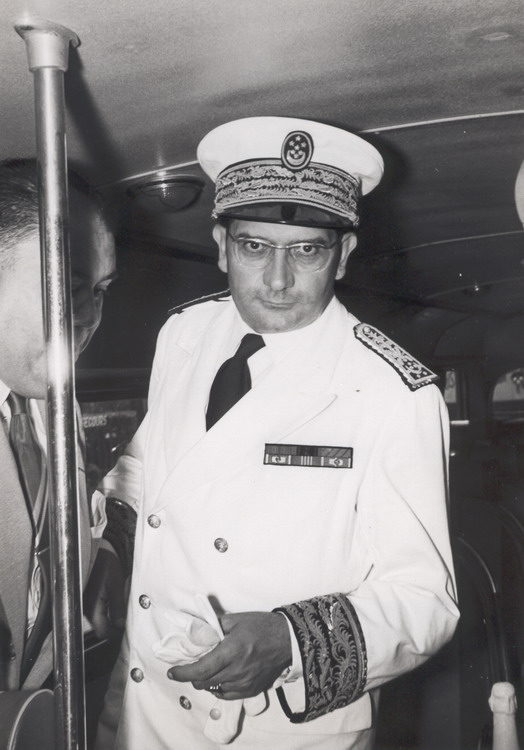
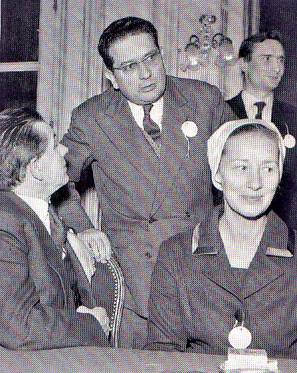
Jacques Soustelle (3 February 1912, Montpellier – 6 August 1990, Neuilly - sur - Seine) was an important and early figure of the Free French Forces and an anthropologist specializing in pre - Columbian civilizations. He became vice director of the Musée de l'Homme in Paris in 1938. He was elected to the Académie française in 1983.
Jacques Soustelle was born in Montpellier in a Protestant working class family. A very brilliant high school student, he was admitted at the first place at the Ecole Normale Supérieure de la rue d'Ulm, which is still the ultimate college within the French educational system (many Nobel Prize winners and Fields Medalists are among its alumni). At the age of 20, he was admitted at the first place at the competitive exam of agrégation de philosophie (high level grade for teaching). An anti - fascist, he was general secretary in 1935 of the French Union of Intellectuals against Fascism.
After the Armistice of 22 June 1940, he left Mexico to join the Free French Forces (FFL) in London. Charles de Gaulle charged him of a diplomatic mission in Latin America (1941), to set up support committees to free France, to cut short the diplomatic efforts of Petainists throughout the continent. He headed the intelligence service Bureau Central de Renseignements et d'Action (BCRA). He joined the Comité national français, (Government of the Free France, fighting Vichy France and the Axis powers ) in London, then ran the commissariat national à l’Information (1942).
Appointed to head the Special Services Branch (DGHS) in Algiers in (1943 – 1944) by the French Committee of National Liberation), he was Commissioner of the Republic (prefect) in Bordeaux then in the Liberation deputy of Mayenne.
In 1945, he served first as Minister of Information, then as Minister of the Colonies. From 1947 to 1951, he served as Secretary General of the Gaullist party Rassemblement du Peuple Français (RPF) and was one De Gaulle's closest councilors.
He was nominated Governor General of Algeria by Pierre Mendès - France in 1955 – 56, favoring the integration of the Muslim community in the French Departments along the Mediterranean coast . Thanks to Soustelle's essential support during the May 1958 Algiers revolt, de Gaulle returned to power.
Though he believed he would become Algeria Secretary, Soustelle was only named Information Minister in June 1958. In 1959, he was appointed Minister of State in charge of Overseas Departments by de Gaulle. He miraculously was safe after three Front de Libération Nationale (FLN) terrorists attempted to assassinate him by shooting his car on the Place de l'Étoile in Paris. He got from de Gaulle a presidential pardon for the only attacker who had been arrested and sentenced to death. Soustelle disagreed with de Gaulle's sudden turn for Algerian independence. He has analyzed this turnaround in his book L'Espérance Trahie (Broken Hope). Soustelle was dismissed from the cabinet and the Gaullist party Union pour la nouvelle République (UNR) in 1960 and joined the terrorist Organisation de l'armée secrète (OAS) in the fight against the independence of Algeria. When the OAS was replaced by the Conseil National de la Résistance (CNR), he joined this new organization as one the heads (around Georges Bidault, former President of the World War II National Council of the Resistance). His activities led him to being sued for attempting to undermine the authority of the French state. He lived in exile between 1961 and his 1968 amnesty.
Soustelle was elected to France's National Assembly (France's lower House) three times, first representing Mayenne in 1945 – 46, then the Rhône (1951 – 58) as a Gaullist, and from 1973 to 1978 as a member of the centrist Mouvement Réformateur. In 1974, he supported the bill legalizing abortion presented by Simone Veil.